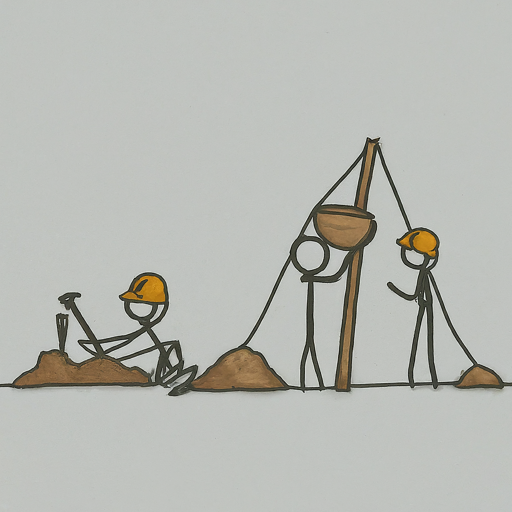Upskilling Nepali migrant workers for increased wages and improved workplace leverage

Estimated reading time: 10 minutes
This proposal presents a solution for the low-skilled Nepali migrant problem: a well-rounded skills upskilling program designed to empower low-skilled Nepali migrant workers seeking employment in construction, agriculture, and service industries abroad. By equipping them with valuable skills and enhancing their employability, we aim to create a brighter future for both the workers and the nation.
TODO: Mahabir Pun dai’s Krishi Aujar karkhana as the perfect spot for training the migrant workers in the South/East.
1. Introduction: A Nation Built on the Shoulders of its Migrant Workers
The story of Nepal is intricately woven with the sacrifices and contributions of its migrant workforce. Over 500,000 Nepalis leave their homes each year, seeking employment abroad to support their families and contribute to the nation’s economic well-being. Yet, their exploration is fraught with challenges – low wages, limited job mobility, and vulnerability to exploitation. While remittances sent back home form a crucial lifeline for the Nepali economy, the individual struggles of these workers remain largely unaddressed.
This proposal presents a solution: a detailed skills upskilling program designed to empower low-skilled Nepali migrant workers seeking employment in construction, agriculture, and service industries abroad.
2. Understanding the ecosystem: From Vulnerability to Opportunity
The global demand for skilled labor in industries like construction, agriculture, and service sectors is steadily rising. Nepal, with its young and increasingly mobile population, stands poised to benefit from this trend. However, a critical gap exists between the skills Nepalis possess and the skills demanded by international employers.
Currently, most Nepali migrant workers occupy low-skilled, labor-intensive jobs with limited earning potential. Their lack of specialized skills translates to stagnant wages, restricted job mobility, and increased vulnerability to exploitation. While existing skills development programs target the broader population, they lack the reach, relevance, and affordability for low-skilled migrant workers. This leaves a significant portion of the workforce trapped in a cycle of low wages and limited opportunities.

3. Imagining a Brighter Future: The Power of Targeted Skills Training
Our proposed program offers a targeted solution to address the challenges faced by low-skilled Nepali migrant workers. We believe that by providing them with relevant and marketable skills, we can empower them to access better-paying jobs, improve their overall well-being, and contribute more meaningfully to Nepal’s economic development.
The program will offer two key components:
-
Pre-departure Training: A 30-day intensive program focusing on job-specific technical skills aligned with market demand. The curriculum will be tailored to different sectors, offering modules in areas like masonry, carpentry, window-cleaning, hospitality training, and basic construction practices. Training will be delivered through a combination of classroom instruction, practical workshops, and language skills enhancement.
-
Vacation Upskilling Opportunities: Recognizing the schedules of migrant workers, the program will offer short modules during their vacations in Nepal. These modules will allow workers to either enhance their existing skills or acquire new ones based on changing market needs, ensuring their continued relevance and competitiveness.

4. Collaboration: Building a Network of Support
We understand that no single entity can address this complex challenge alone. Therefore, we see a collaborative angle to ensure the program’s success. We will partner with the following stakeholders:
-
Manpower companies: As key players in the recruitment process, manpower companies have a vested interest in the success of their workers. We will collaborate with them to identify training needs, market relevant skills, and support workers in the program.
-
Non-governmental organizations (NGOs): Many NGOs possess expertise in skills development and migrant worker issues. We will partner with them to leverage their knowledge, networks, and community outreach capabilities.
-
Government technical schools (CTEVT): Nepal’s CTEVT program offers technical training in multiple fields. We will collaborate with these institutions to access infrastructure, training facilities, and experienced instructors.
-
International development agencies: Recognizing the program’s social impact potential, we will seek partnerships with international development agencies to secure funding and technical assistance.
This collaborative approach will create an ecosystem of support, ensuring the program’s reach, effectiveness, and long-term sustainability.
5. Measuring Success: Beyond Numbers, a Human Impact
While numerical measures are important, we believe in evaluating success beyond just statistics. Our program will track the following key indicators:
-
Increased Wages: We aim for a 20% increase in average monthly wages for trained workers within six months of program completion.
-
Improved Job Placements: We will track successful placements in better-paying, skilled jobs with reputable employers.
-
Increased Worker Satisfaction: Through surveys and feedback mechanisms, we will measure worker satisfaction with the program, their skills development, and their overall perception of their work experience.
-
Long-term Impact: We will track the long-term impact on workers’ lives, including improvements in family well-being, contribution to remittances, and reduced vulnerability to exploitation.
By diligently monitoring these metrics and conducting impact assessments, we will not only show the program’s effectiveness but also show its impact on the lives
Beyond Remittances: Investing in Dignity - Upskilling Nepal’s Migrant Workforce
Every dawn, a tide of hope departs Nepal. Over 500,000 individuals, predominantly young and ambitious, go on a trip not of personal exploration, but of economic necessity. They leave behind families, dreams, and a familiar community, braving unknown lands and uncertain futures in search of employment abroad. These are the invisible hands that run our economy, their remittances forming the lifeblood of countless households. Yet, for all their sacrifices, their own lives struggle under the strain of low wages, limited opportunities, and vulnerability.
The narrative, however, doesn’t have to end there. Imagine a future where these same “invisible hands” become skilled, empowered tools, wielding not just physical labor, but specialized expertise. This is the vision behind a proposed program aiming to upskill low-skilled Nepali migrant workers seeking employment in construction, agriculture, and service industries abroad.
The current picture paints a stark reality. While global demand for skilled labor in these sectors is rising, Nepali workers lack the specific skills to capitalize on it. They find themselves trapped in a cycle of low-paying, labor-intensive jobs, their limited mobility constricting their earning potential and exposing them to exploitation. Existing skills development programs, though valuable, rarely reach this specific demographic due to lack of accessibility, relevance, and affordability.
Our proposed program seeks to bridge this gap, not just through skills training, but through a holistic approach that recognizes the complex socio-economic situation of migrant workers. Imagine a 30-day pre-departure training program, not just equipping workers with job-specific technical skills tailored to market demands – masonry, carpentry, window-cleaning, hospitality training – but also providing financial literacy workshops, language enhancement modules, and cultural sensitivity training. Imagine further: short upskilling modules during vacations in Nepal, allowing workers to hone existing skills or acquire new ones based on adapting markets. This ongoing training ensures their continued relevance and competitiveness, but goes beyond, empowering them to deal with diverse work environments and advocate for their rights.
But this trip cannot be taken alone. Collaboration is of the utmost important. We foresee partnering with manpower companies, leveraging their knowledge of recruitment, market needs, and worker demographics. NGOs bring invaluable expertise in skills development, migrant worker issues, and community outreach. Government technical schools offer readily available infrastructure and experienced instructors, while international development agencies, recognizing the program’s social impact potential, can lend support through funding and technical assistance.
Success won’t just be measured in numbers. Yes, a 20% increase in average monthly wages for trained workers is our target, along with placements in better-paying, skilled jobs with reputable employers. But we look beyond immediate gains. We expect improved worker satisfaction, a sense of empowerment derived from newfound skills and bargaining power. We see families back home benefiting from increased remittances, contributing to a stronger national economy. And importantly, we hope of a future where exploitation finds less fertile ground, replaced by the dignity of skilled labor and fair compensation.
This program is not just about empowering individuals; it’s about creating a ripple effect, impacting families, communities, and the nation itself. It’s about recognizing the true value of Nepal’s “invisible hands” and equipping them to build a brighter future, not just for themselves, but for the nation they carry within their hearts.
The time for action is now. Let us join hands, stakeholders and citizens alike, to invest in this program. Let us empower our migrant workforce, not just for their sake, but for the sake of a stronger, more prosperous Nepal. This is not just an economic imperative; it’s a moral responsibility, a chance to honor the sacrifices of those who leave their homes to build a better tomorrow, not just for their families, but for us all.
However, we must acknowledge the challenges. Funding remains a nig hurdle, it needs innovative partnerships and a shift in perspectives. Skepticism towards the long-term impact or concerns about worker exploitation after upskilling need to be addressed through monitoring and ethical frameworks. Moreover, ensuring program sustainability requires a commitment from all stakeholders, from government support to individual worker buy-in.
But these challenges are not insurmountable. They are merely stepping stones on a path towards a brighter future. The potential impact of this program is undeniable. Imagine the ripple effect - empowered workers sending back not just remittances, but valuable skills and knowledge, contributing to Nepal’s development both financially and socially. Imagine a nation recognized for its skilled workforce, not just for the low-wage labor it exports. This is the future we can build, together.
